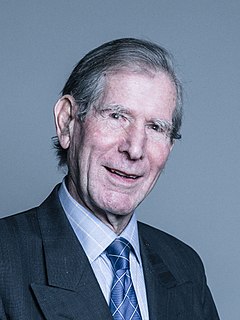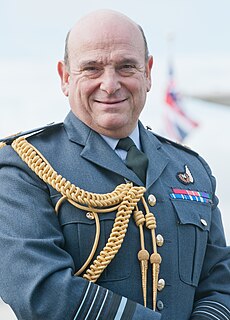Air Chief Marshal Sir Brian Kevin Burridge, is a retired Royal Air Force officer. A former Nimrod pilot, Burridge was in overall command of British forces under Operation Telic during the 2003 invasion of Iraq.
Marshal of the Royal Air Force Sir Peter Robin Harding, is a retired Royal Air Force officer who served as a bomber pilot in the 1950s, a helicopter squadron commander in the 1960s and a station commander in the 1970s. He became Chief of the Air Staff in 1988 and served in that role during the Gulf War in 1991. He became Chief of the Defence Staff in December 1992 but resigned after his affair with Lady (Bienvenida) Buck, the wife of Conservative MP Antony Buck, became public.

Air Chief Marshal Sir Richard Edward Johns, is a retired senior Royal Air Force commander. He was a fighter pilot in the 1960s, commanding officer of a squadron during the 1970s and a station commander in the 1980s. Johns served as one of three British directors of operations on the senior planning staff for Operation Granby in 1991 and then acted as a supporting commander for joint operations in the Balkans in 1994. As Chief of the Air Staff he advised the British Government on the air force aspects of the Strategic Defence Review and on NATO's air campaign in Kosovo.
Air Marshal Sir David Allan Walker, is a Director at Alexander Mann Solutions, and a member of the Advisory Board of Auticon. He is a former senior Royal Air Force officer and Master of the Household to the Sovereign.

Marshal of the Royal Air Force Sir Andrew Henry Humphrey, was a senior officer in the Royal Air Force. He fought in the Second World War as a fighter pilot taking part in the Battle of Britain and also took part in the withdrawal from Aden in November 1967. He served as the Chief of the Air Staff advising the new Labour Government on the implementation of their latest Defence Review. He then served as Chief of the Defence Staff but caught pneumonia within three months of taking office and died shortly afterwards.
Air Chief Marshal Sir Michael James Graydon, is a retired Royal Air Force (RAF) officer. He was a fast jet pilot in the 1960s, a squadron commander in the 1970s and a station commander in the 1980s before serving as Air Officer Commanding-in-Chief RAF Strike Command during the Gulf War. He was Chief of the Air Staff from 1992 to 1997 in which role he advised the British Government on the implementation of No Fly Zones in Iraq and Bosnia and implemented the Front Line First initiative.
Air Chief Marshal Sir Peter Ted Squire, was a senior Royal Air Force commander. He was a fast jet pilot in the 1970s, a squadron commander during the Falklands War and a senior air commander in the 1990s. Squire was Chief of the Air Staff from 2000 to 2003 during which time both Operation Veritas and Operation Telic were initiated. In retirement he became Chairman of the Board of Trustees of the Imperial War Museum and Vice-Chairman of the Board of the Commonwealth War Graves Commission.

Marshal of the Royal Air Force David Brownrigg Craig, Baron Craig of Radley, is a retired Royal Air Force officer and member of the House of Lords. He was a fast jet pilot in the 1950s, a squadron commander in the 1960s and a station commander in the 1970s. He served as Chief of the Air Staff during the late 1980s, when the Boeing Airborne early warning and control system was ordered and the European Fighter programme was being developed. He then served as Chief of the Defence Staff during the Gulf War. He was granted a life peerage as Baron Craig of Radley after his retirement from active service in 1991, sitting as a crossbencher.

Marshal of the Royal Air Force Samuel Charles Elworthy, Baron Elworthy, was a senior officer in the Royal Air Force. He served as commander of a squadron of Blenheim bombers and then as a station commander during the Second World War. He became Chief of the Air Staff in the mid-1960s and implemented the cancellation of the TSR-2 strike aircraft and the HS681 military transport aircraft programmes. He also became Chief of the Defence Staff in which role he oversaw the evacuation from Aden in November 1967 and had to respond to the growing crisis in Northern Ireland in the late 1960s.

Marshal of the Royal Air Force Sir Denis Frank Spotswood, was a senior commander in the Royal Air Force. He fought in the Second World War as a flying boat pilot and then as a coastal reconnaissance squadron commander during Operation Torch, the invasion of North Africa. He served as a station commander in the late 1940s and early 1950s before becoming a senior air commander in the late 1950s. As the Chief of the Air Staff in the early 1970s he had a major role in implementing the defence savings demanded by the Heath Government in the face of economic difficulties at the time.

Air Chief Marshal Sir Christopher Hugh "Chris" Moran, was a fast jet pilot and later a senior commander in the Royal Air Force. He was Commander-in-Chief of Air Command at the time of his unexpected death.
Air Chief Marshal Sir Anthony Wilkinson Heward, was a senior Royal Air Force (RAF) commander.
Air Chief Marshal Sir John Barraclough was a Royal Air Force pilot during the Second World War who went on to become Vice-Chief of the Defence Staff.
Air Marshal Susan Catherine Gray, is a British engineer and senior Royal Air Force officer. Since 2019, she has been Director-General of the Defence Safety Authority. She served as Director of Combat Air at Defence Equipment and Support in the Ministry of Defence (2014–2016), and as Air Officer Commanding No 38 Group (2016–2018). She is the most senior female officer in the British Armed Forces.

Air Chief Marshal Sir Stuart William Peach, is a senior Royal Air Force officer. After training as a navigator, Peach commanded IX (Bomber) Squadron and then became Deputy Station Commander RAF Bruggen. He was deployed as NATO Air Commander (Forward) in Kosovo in 2000. He went on to be Chief of Defence Intelligence in 2006, Chief of Joint Operations in 2009 and the first Commander of Joint Forces Command in December 2011 before being appointed Vice-Chief of the Defence Staff in May 2013. Peach succeeded General Sir Nick Houghton as Chief of the Defence Staff on 14 July 2016. He succeeded General Petr Pavel as Chairman of the NATO Military Committee on 29 June 2018.
Air Chief Marshal Sir Joseph Alfred Gilbert, is a former Royal Air Force officer who served as Deputy Commander of Strike Command from 1984 to 1986.
Air Marshal Sir Kevin James Leeson, is a retired Royal Air Force engineer officer, whose final appointment was as Chief of Materiel – Air at the Defence Equipment and Support organisation, concurrently holding the appointments of Air Member for Materiel on the Air Force Board and Chief Engineer (RAF), at which point he was the most senior non-aircrew officer in the service.
Air Marshal Edward Jackson Stringer, is a senior Royal Air Force officer. Since April 2018, he has been Director General of the Defence Academy and of Joint Force Development, Joint Forces Command. He served as Assistant Chief of the Air Staff from April 2013 to January 2015, and as Assistant Chief of the Defence Staff (Operations) from March 2015 to 2018.
Air Marshal Julian Alexander Young, is a Royal Air Force (RAF) officer who currently serves as Chief of Materiel – Air at Defence Equipment and Support.
David Anthony Hobart, is a British executive, aeronautical engineer, and former Royal Air Force (RAF) officer. Having been commissioned into the RAF in 1972, he reached the rank of air vice-marshal and served as Assistant Chief of the Defence Staff (Policy) from 2001 to 2004. Following retirement from the military, he was chief executive of the Bar Council from 2004 to 2011, and has been chief executive of the City of London Law Society since 2011. He has also been a Gentleman Usher to Queen Elizabeth II since 2007.











